HTMLTestRunner测试报告
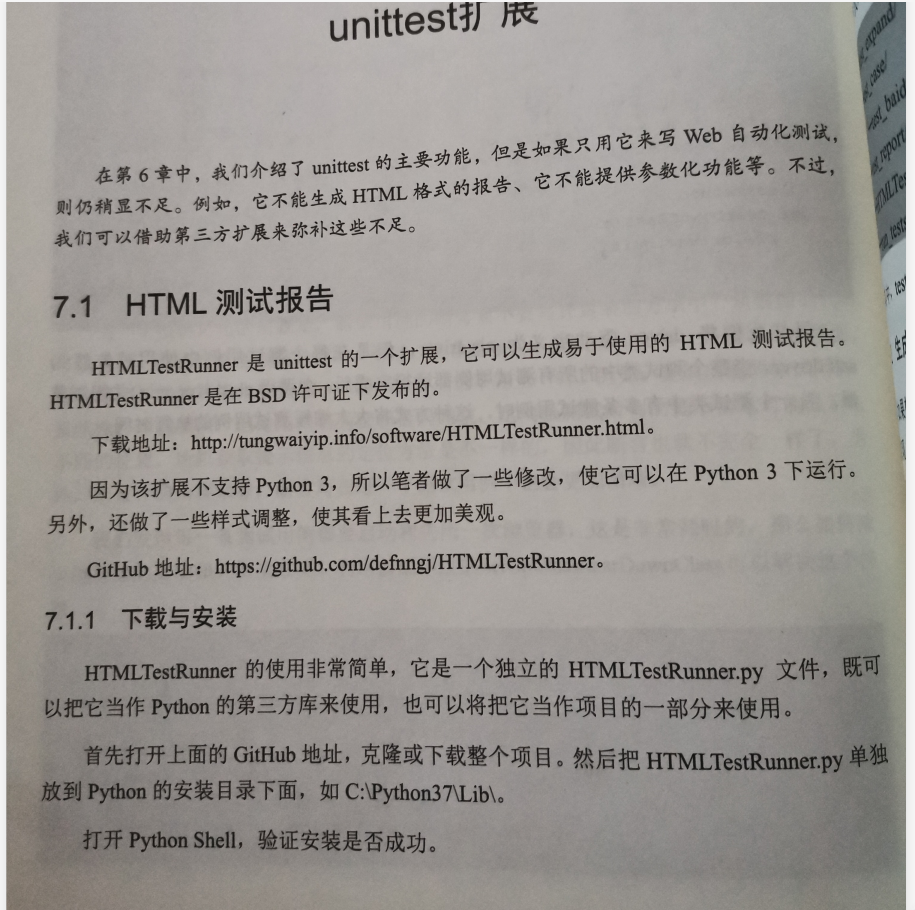
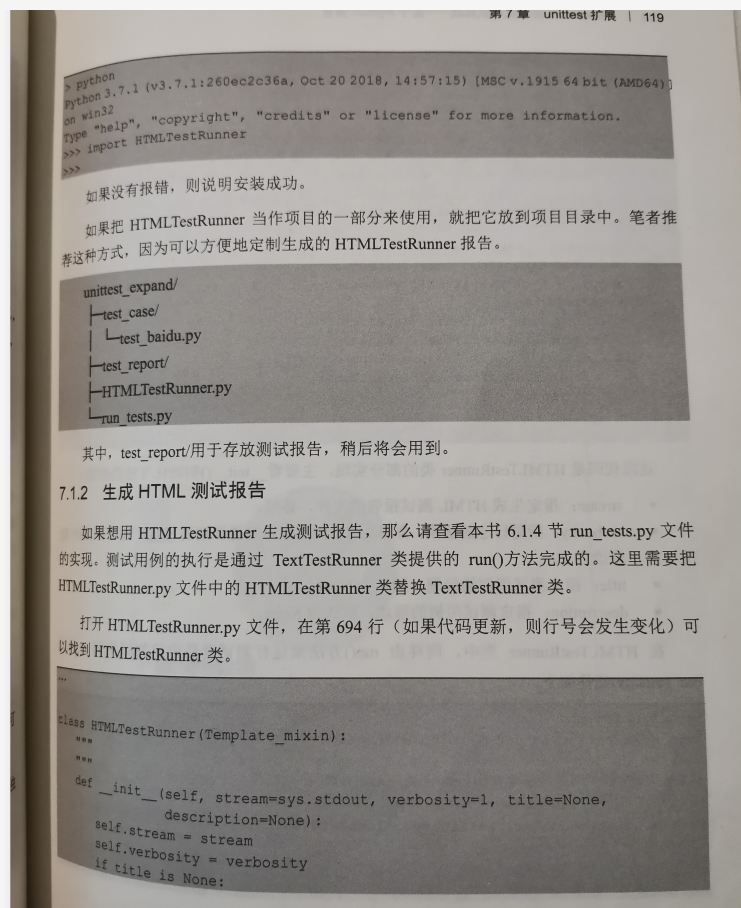
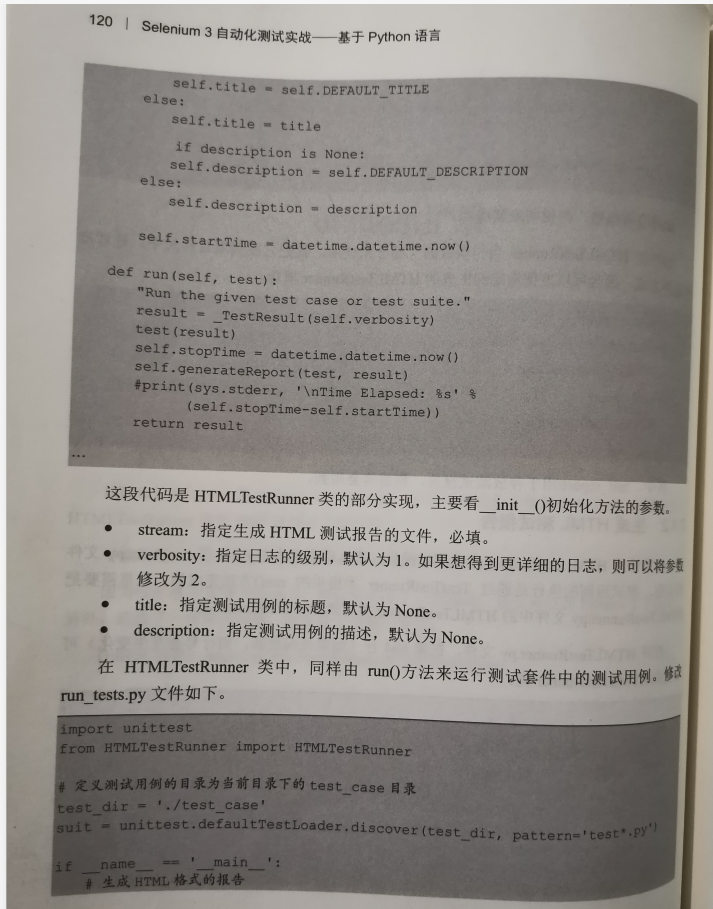
把测试报告写入文件中,设置报告生成的路径
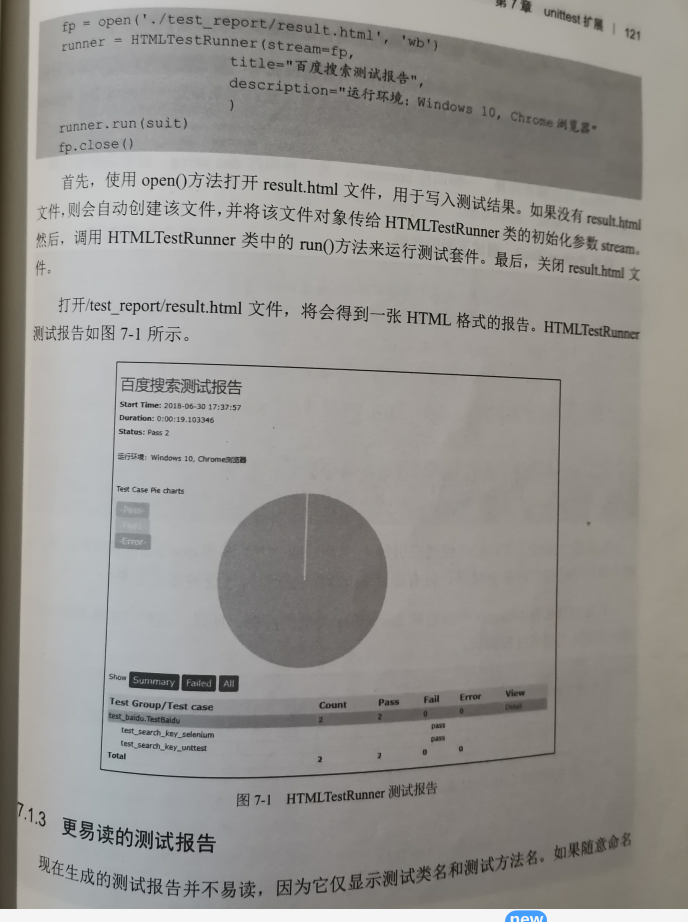
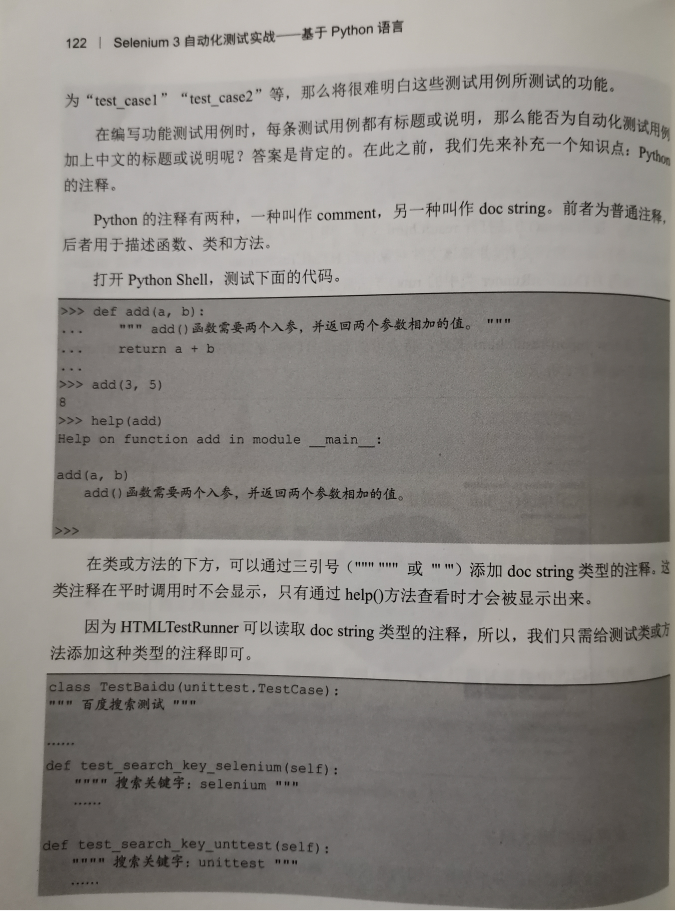
测试报告名称上添加时间
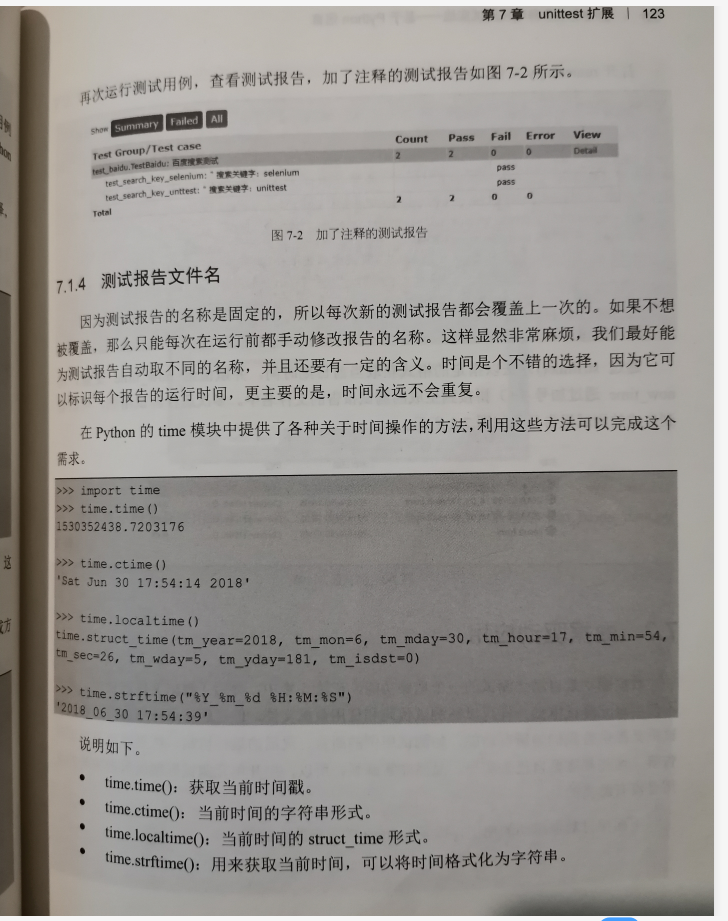
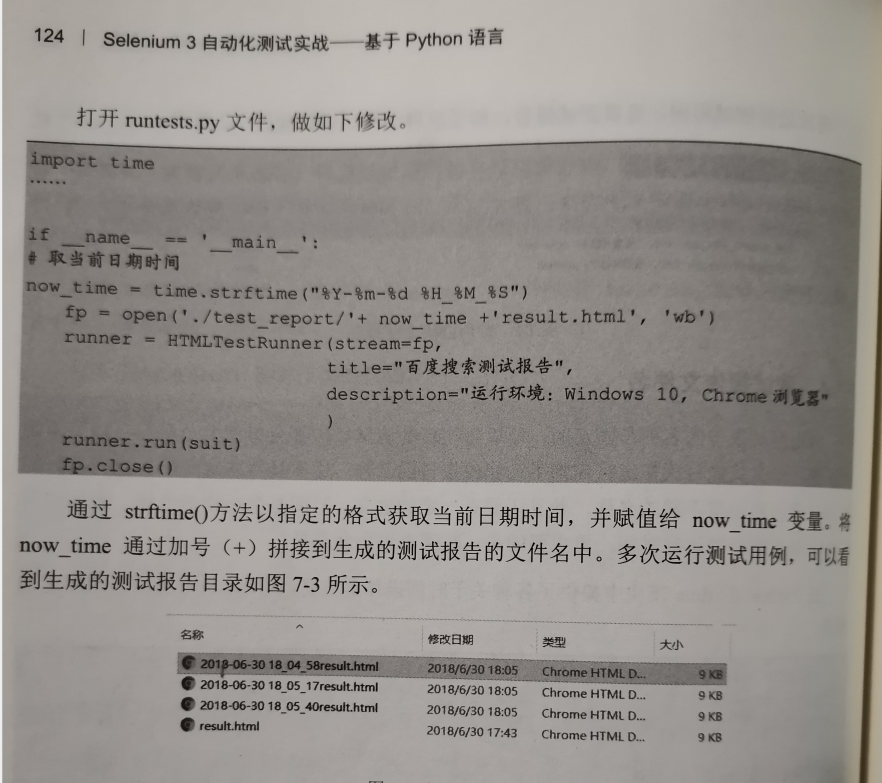
HTMLTestRunner文件如下,复制即可用,把该文件放在Lib下即可
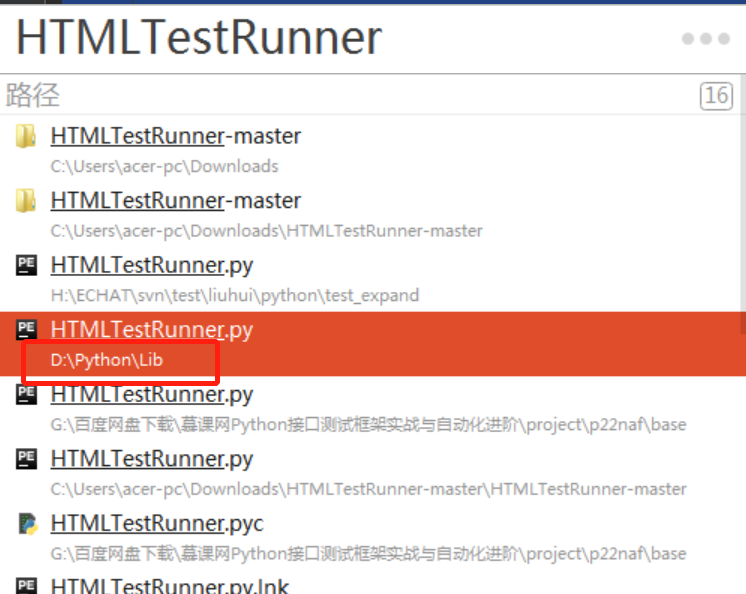
"""
A TestRunner for use with the Python unit testing framework. It
generates a HTML report to show the result at a glance.
The simplest way to use this is to invoke its main method. E.g.
import unittest
import HTMLTestRunner
... define your tests ...
if __name__ == '__main__':
HTMLTestRunner.main()
For more customization options, instantiates a HTMLTestRunner object.
HTMLTestRunner is a counterpart to unittest's TextTestRunner. E.g.
# output to a file
fp = file('my_report.html', 'wb')
runner = HTMLTestRunner.HTMLTestRunner(
stream=fp,
title='My unit test',
description='This demonstrates the report output by HTMLTestRunner.'
)
# Use an external stylesheet.
# See the Template_mixin class for more customizable options
runner.STYLESHEET_TMPL = '<link rel="stylesheet" href="my_stylesheet.css" type="text/css">'
# run the test
runner.run(my_test_suite)
------------------------------------------------------------------------
Copyright (c) 2004-2007, Wai Yip Tung
All rights reserved.
Redistribution and use in source and binary forms, with or without
modification, are permitted provided that the following conditions are
met:
* Redistributions of source code must retain the above copyright notice,
this list of conditions and the following disclaimer.
* Redistributions in binary form must reproduce the above copyright
notice, this list of conditions and the following disclaimer in the
documentation and/or other materials provided with the distribution.
* Neither the name Wai Yip Tung nor the names of its contributors may be
used to endorse or promote products derived from this software without
specific prior written permission.
THIS SOFTWARE IS PROVIDED BY THE COPYRIGHT HOLDERS AND CONTRIBUTORS "AS
IS" AND ANY EXPRESS OR IMPLIED WARRANTIES, INCLUDING, BUT NOT LIMITED
TO, THE IMPLIED WARRANTIES OF MERCHANTABILITY AND FITNESS FOR A
PARTICULAR PURPOSE ARE DISCLAIMED. IN NO EVENT SHALL THE COPYRIGHT OWNER
OR CONTRIBUTORS BE LIABLE FOR ANY DIRECT, INDIRECT, INCIDENTAL, SPECIAL,
EXEMPLARY, OR CONSEQUENTIAL DAMAGES (INCLUDING, BUT NOT LIMITED TO,
PROCUREMENT OF SUBSTITUTE GOODS OR SERVICES; LOSS OF USE, DATA, OR
PROFITS; OR BUSINESS INTERRUPTION) HOWEVER CAUSED AND ON ANY THEORY OF
LIABILITY, WHETHER IN CONTRACT, STRICT LIABILITY, OR TORT (INCLUDING
NEGLIGENCE OR OTHERWISE) ARISING IN ANY WAY OUT OF THE USE OF THIS
SOFTWARE, EVEN IF ADVISED OF THE POSSIBILITY OF SUCH DAMAGE.
"""
# URL: http://tungwaiyip.info/software/HTMLTestRunner.html
__author__ = "Wai Yip Tung , bugmaster"
__version__ = "0.8.2"
"""
Change History
Version 0.8.2
* Show output inline instead of popup window (Viorel Lupu).
Version in 0.8.1
* Validated XHTML (Wolfgang Borgert).
* Added description of test classes and test cases.
Version in 0.8.0
* Define Template_mixin class for customization.
* Workaround a IE 6 bug that it does not treat <script> block as CDATA.
Version in 0.7.1
* Back port to Python 2.3 (Frank Horowitz).
* Fix missing scroll bars in detail log (Podi).
"""
# TODO: color stderr
# TODO: simplify javascript using ,ore than 1 class in the class attribute?
import datetime
import io
import sys
import time
import unittest
from xml.sax import saxutils
# ------------------------------------------------------------------------
# The redirectors below are used to capture output during testing. Output
# sent to sys.stdout and sys.stderr are automatically captured. However
# in some cases sys.stdout is already cached before HTMLTestRunner is
# invoked (e.g. calling logging.basicConfig). In order to capture those
# output, use the redirectors for the cached stream.
#
# e.g.
# >>> logging.basicConfig(stream=HTMLTestRunner.stdout_redirector)
# >>>
class OutputRedirector(object):
""" Wrapper to redirect stdout or stderr """
def __init__(self, fp):
self.fp = fp
def write(self, s):
self.fp.write(s)
def writelines(self, lines):
self.fp.writelines(lines)
def flush(self):
self.fp.flush()
stdout_redirector = OutputRedirector(sys.stdout)
stderr_redirector = OutputRedirector(sys.stderr)
# ----------------------------------------------------------------------
# Template
class Template_mixin(object):
"""
Define a HTML template for report customerization and generation.
Overall structure of an HTML report
HTML
+------------------------+
|<html> |
| <head> |
| |
| STYLESHEET |
| +----------------+ |
| | | |
| +----------------+ |
| |
| </head> |
| |
| <body> |
| |
| HEADING |
| +----------------+ |
| | | |
| +----------------+ |
| |
| REPORT |
| +----------------+ |
| | | |
| +----------------+ |
| |
| ENDING |
| +----------------+ |
| | | |
| +----------------+ |
| |
| </body> |
|</html> |
+------------------------+
"""
STATUS = {
0: 'pass',
1: 'fail',
2: 'error',
}
DEFAULT_TITLE = 'Unit Test Report'
DEFAULT_DESCRIPTION = ''
# ------------------------------------------------------------------------
# HTML Template
HTML_TMPL = r"""<?xml version="1.0" encoding="UTF-8"?>
<!DOCTYPE html PUBLIC "-//W3C//DTD XHTML 1.0 Strict//EN" "http://www.w3.org/TR/xhtml1/DTD/xhtml1-strict.dtd">
<html xmlns="http://www.w3.org/1999/xhtml">
<head>
<title>%(title)s</title>
<meta name="generator" content="%(generator)s"/>
<meta http-equiv="Content-Type" content="text/html; charset=UTF-8"/>
<script src="https://code.jquery.com/jquery-3.3.1.slim.min.js"></script>
<script src="https://cdnjs.cloudflare.com/ajax/libs/popper.js/1.14.7/umd/popper.min.js"></script>
<script src="https://stackpath.bootstrapcdn.com/bootstrap/4.3.1/js/bootstrap.min.js"></script>
<script src="http://apps.bdimg.com/libs/Chart.js/0.2.0/Chart.min.js"></script>
<!-- <link href="https://cdn.bootcss.com/echarts/3.8.5/echarts.common.min.js" rel="stylesheet"> -->
<link rel="stylesheet" href="https://stackpath.bootstrapcdn.com/bootstrap/4.3.1/css/bootstrap.min.css">
%(stylesheet)s
</head>
<body>
<script language="javascript" type="text/javascript"><!--
output_list = Array();
/* level - 0:Summary; 1:Failed; 2:All */
function showCase(level) {
trs = document.getElementsByTagName("tr");
for (var i = 0; i < trs.length; i++) {
tr = trs[i];
id = tr.id;
if (id.substr(0,2) == 'ft') {
if (level < 1) {
tr.className = 'hiddenRow';
}
else {
tr.className = '';
}
}
if (id.substr(0,2) == 'pt') {
if (level > 1) {
tr.className = '';
}
else {
tr.className = 'hiddenRow';
}
}
}
}
function showClassDetail(cid, count) {
var id_list = Array(count);
var toHide = 1;
for (var i = 0; i < count; i++) {
tid0 = 't' + cid.substr(1) + '.' + (i+1);
tid = 'f' + tid0;
tr = document.getElementById(tid);
if (!tr) {
tid = 'p' + tid0;
tr = document.getElementById(tid);
}
id_list[i] = tid;
if (tr.className) {
toHide = 0;
}
}
for (var i = 0; i < count; i++) {
tid = id_list[i];
if (toHide) {
document.getElementById('div_'+tid).style.display = 'none'
document.getElementById(tid).className = 'hiddenRow';
}
else {
document.getElementById(tid).className = '';
}
}
}
function showTestDetail(div_id){
var details_div = document.getElementById(div_id)
var displayState = details_div.style.display
// alert(displayState)
if (displayState != 'block' ) {
displayState = 'block'
details_div.style.display = 'block'
}
else {
details_div.style.display = 'none'
}
}
function html_escape(s) {
s = s.replace(/&/g,'&');
s = s.replace(/</g,'<');
s = s.replace(/>/g,'>');
return s;
}
/* obsoleted by detail in <div>
function showOutput(id, name) {
var w = window.open("", //url
name,
"resizable,scrollbars,status,width=800,height=450");
d = w.document;
d.write("<pre>");
d.write(html_escape(output_list[id]));
d.write("\n");
d.write("<a href='javascript:window.close()'>close</a>\n");
d.write("</pre>\n");
d.close();
}
*/
--></script>
%(heading)s
%(report)s
%(ending)s
%(chart_script)s
</body>
</html>
"""
# variables: (title, generator, stylesheet, heading, report, ending)
# ------------------------------------------------------------------------
# Stylesheet
#
# alternatively use a <link> for external style sheet, e.g.
# <link rel="stylesheet" href="$url" type="text/css">
STYLESHEET_TMPL = """
<style type="text/css" media="screen">
body { font-family: verdana, arial, helvetica, sans-serif; font-size: 80%; }
table { font-size: 100%; }
pre { }
/* -- heading ---------------------------------------------------------------------- */
h1 {
font-size: 16pt;
color: gray;
}
.heading {
margin-top: 0ex;
margin-bottom: 1ex;
margin-left: 10px;
}
.heading .attribute {
margin-top: 1ex;
margin-bottom: 0;
}
.heading .description {
margin-top: 4ex;
margin-bottom: 6ex;
}
/* -- css div popup ------------------------------------------------------------------------ */
a.popup_link {
}
a.popup_link:hover {
color: red;
}
.popup_window {
display: none;
position: relative;
left: 0px;
top: 0px;
/*border: solid #627173 1px; */
font-family: "Lucida Console", "Courier New", Courier, monospace;
text-align: left;
font-size: 8pt;
width: 500px;
}
}
/* -- report ------------------------------------------------------------------------ */
#show_detail_line {
margin-top: 3ex;
margin-bottom: 1ex;
margin-left: 10px;
}
#result_table {
width: 80%;
border-collapse: collapse;
border: 1px solid #777;
margin-left: 10px;
}
#header_row {
font-weight: bold;
color: #606060;
background-color: #f5f5f5;
border-top-width: 10px;
border-color: #d6e9c6;
font-size: 12px;
}
#result_table td {
border: 1px solid #f5f5f5;
padding: 2px;
}
#total_row { font-weight: bold; }
.passClass { background-color: #d6e9c6; }
.failClass { background-color: #faebcc; }
.errorClass { background-color: #ebccd1; }
.passCase { color: #6c6; }
.failCase { color: #c60; font-weight: bold; }
.errorCase { color: #c00; font-weight: bold; }
.hiddenRow { display: none; }
.testcase { margin-left: 2em; }
/* -- ending ---------------------------------------------------------------------- */
#ending {
}
/* -- chars ---------------------------------------------------------------------- */
.testChars {margin-left: 150px;}
.btn-info1 {
color: #fff;
background-color: #d6e9c6;
border-color: #d6e9c6;
}
.btn-info2 {
color: #fff;
background-color: #faebcc;
border-color: #faebcc;
}
.btn-info3 {
color: #fff;
background-color: #ebccd1;
border-color: #ebccd1;
}
</style>
"""
# ------------------------------------------------------------------------
# Heading
#
HEADING_TMPL = """<div class='heading'>
<h1>%(title)s</h1>
%(parameters)s
<p class='description'>%(description)s</p>
</div>
<div style="float:left; margin-left: 10px;">
<p> Test Case Pie charts </p>
<a class="btn btn-xs btn-info1">-Pass-</a><br>
<a class="btn btn-xs btn-info2">-Faild-</a><br>
<a class="btn btn-xs btn-info3">-Error-</a><br>
</div>
<div class="testChars">
<canvas id="myChart" width="250" height="250"></canvas>
</div>
""" # variables: (title, parameters, description)
# ------------------------------------------------------------------------
# Pie chart
#
ECHARTS_SCRIPT = """
<script type="text/javascript">
var data = [
{
value: %(error)s,
color: "#ebccd1",
label: "Error",
labelColor: 'white',
labelFontSize: '16'
},
{
value : %(fail)s,
color : "#faebcc",
label: "Fail",
labelColor: 'white',
labelFontSize: '16'
},
{
value : %(Pass)s,
color : "#d6e9c6",
label : "Pass",
labelColor: 'white',
labelFontSize: '16'
}
]
var newopts = {
animationSteps: 100,
animationEasing: 'easeInOutQuart',
}
//Get the context of the canvas element we want to select
var ctx = document.getElementById("myChart").getContext("2d");
var myNewChart = new Chart(ctx).Pie(data,newopts);
</script>
"""
HEADING_ATTRIBUTE_TMPL = """<p class='attribute'><strong>%(name)s:</strong> %(value)s</p>
""" # variables: (name, value)
# ------------------------------------------------------------------------
# Report
#
REPORT_TMPL = """
<p id='show_detail_line' style="margin-left: 10px;">Show
<a href='javascript:showCase(0)' class="btn btn-outline-primary btn-sm">Summary</a>
<a href='javascript:showCase(1)' class="btn btn-outline-warning btn-sm">Failed</a>
<a href='javascript:showCase(2)' class="btn btn-outline-info btn-sm">All</a>
</p>
<table id='result_table'>
<colgroup>
<col align='left' />
<col align='right' />
<col align='right' />
<col align='right' />
<col align='right' />
<col align='right' />
</colgroup>
<tr id='header_row' class="panel-title">
<td>Test Group/Test case</td>
<td>Count</td>
<td>Pass</td>
<td>Fail</td>
<td>Error</td>
<td>View</td>
</tr>
%(test_list)s
<tr id='total_row'>
<td>Total</td>
<td>%(count)s</td>
<td class="text text-success">%(Pass)s</td>
<td class="text text-danger">%(fail)s</td>
<td class="text text-warning">%(error)s</td>
<td> </td>
</tr>
</table>
""" # variables: (test_list, count, Pass, fail, error)
REPORT_CLASS_TMPL = r"""
<tr class='%(style)s'>
<td>%(desc)s</td>
<td>%(count)s</td>
<td>%(Pass)s</td>
<td>%(fail)s</td>
<td>%(error)s</td>
<td><a href="javascript:showClassDetail('%(cid)s',%(count)s)">Detail</a></td>
</tr>
""" # variables: (style, desc, count, Pass, fail, error, cid)
REPORT_TEST_WITH_OUTPUT_TMPL = r"""
<tr id='%(tid)s' class='%(Class)s'>
<td class='%(style)s'><div class='testcase'>%(desc)s</div></td>
<td colspan='5' align='center'>
<!--css div popup start-->
<a class="popup_link" onfocus='this.blur();' href="javascript:showTestDetail('div_%(tid)s')" >
%(status)s</a>
<div id='div_%(tid)s' class="popup_window">
<div style='text-align: right; color:red;cursor:pointer'>
<a onfocus='this.blur();' onclick="document.getElementById('div_%(tid)s').style.display = 'none' " >
[x]</a>
</div>
<pre>
%(script)s
</pre>
</div>
<!--css div popup end-->
</td>
</tr>
""" # variables: (tid, Class, style, desc, status)
REPORT_TEST_NO_OUTPUT_TMPL = r"""
<tr id='%(tid)s' class='%(Class)s'>
<td class='%(style)s'><div class='testcase'>%(desc)s</div></td>
<td colspan='5' align='center'>%(status)s</td>
</tr>
""" # variables: (tid, Class, style, desc, status)
REPORT_TEST_OUTPUT_TMPL = r"""
%(id)s: %(output)s
""" # variables: (id, output)
# ------------------------------------------------------------------------
# ENDING
#
ENDING_TMPL = """<div id='ending'> </div>"""
# -------------------- The end of the Template class -------------------
TestResult = unittest.TestResult
class _TestResult(TestResult):
# note: _TestResult is a pure representation of results.
# It lacks the output and reporting ability compares to unittest._TextTestResult.
def __init__(self, verbosity=1):
TestResult.__init__(self)
self.stdout0 = None
self.stderr0 = None
self.success_count = 0
self.failure_count = 0
self.error_count = 0
self.verbosity = verbosity
# result is a list of result in 4 tuple
# (
# result code (0: success; 1: fail; 2: error),
# TestCase object,
# Test output (byte string),
# stack trace,
# )
self.result = []
def startTest(self, test):
TestResult.startTest(self, test)
# just one buffer for both stdout and stderr
self.outputBuffer = io.StringIO()
stdout_redirector.fp = self.outputBuffer
stderr_redirector.fp = self.outputBuffer
self.stdout0 = sys.stdout
self.stderr0 = sys.stderr
sys.stdout = stdout_redirector
sys.stderr = stderr_redirector
def complete_output(self):
"""
Disconnect output redirection and return buffer.
Safe to call multiple times.
"""
if self.stdout0:
sys.stdout = self.stdout0
sys.stderr = self.stderr0
self.stdout0 = None
self.stderr0 = None
return self.outputBuffer.getvalue()
def stopTest(self, test):
# Usually one of addSuccess, addError or addFailure would have been called.
# But there are some path in unittest that would bypass this.
# We must disconnect stdout in stopTest(), which is guaranteed to be called.
self.complete_output()
def addSuccess(self, test):
self.success_count += 1
TestResult.addSuccess(self, test)
output = self.complete_output()
self.result.append((0, test, output, ''))
if self.verbosity > 1:
sys.stderr.write('ok ')
sys.stderr.write(str(test))
sys.stderr.write('\n')
else:
sys.stderr.write('.'+str(self.success_count))
def addError(self, test, err):
self.error_count += 1
TestResult.addError(self, test, err)
_, _exc_str = self.errors[-1]
output = self.complete_output()
self.result.append((2, test, output, _exc_str))
if self.verbosity > 1:
sys.stderr.write('E ')
sys.stderr.write(str(test))
sys.stderr.write('\n')
else:
sys.stderr.write('E')
def addFailure(self, test, err):
self.failure_count += 1
TestResult.addFailure(self, test, err)
_, _exc_str = self.failures[-1]
output = self.complete_output()
self.result.append((1, test, output, _exc_str))
if self.verbosity > 1:
sys.stderr.write('F ')
sys.stderr.write(str(test))
sys.stderr.write('\n')
else:
sys.stderr.write('F')
class HTMLTestRunner(Template_mixin):
"""
"""
def __init__(self, stream=sys.stdout, verbosity=1, title=None, description=None):
self.stream = stream
self.verbosity = verbosity
if title is None:
self.title = self.DEFAULT_TITLE
else:
self.title = title
if description is None:
self.description = self.DEFAULT_DESCRIPTION
else:
self.description = description
self.startTime = datetime.datetime.now()
def run(self, test):
"Run the given test case or test suite."
result = _TestResult(self.verbosity)
test(result)
self.stopTime = datetime.datetime.now()
self.generateReport(test, result)
#print(sys.stderr, '\nTime Elapsed: %s' % (self.stopTime-self.startTime))
return result
def sortResult(self, result_list):
# unittest does not seems to run in any particular order.
# Here at least we want to group them together by class.
rmap = {}
classes = []
for n,t,o,e in result_list:
cls = t.__class__
if not cls in rmap:
rmap[cls] = []
classes.append(cls)
rmap[cls].append((n,t,o,e))
r = [(cls, rmap[cls]) for cls in classes]
return r
def getReportAttributes(self, result):
"""
Return report attributes as a list of (name, value).
Override this to add custom attributes.
"""
startTime = str(self.startTime)[:19]
duration = str(self.stopTime - self.startTime)
status = []
if result.success_count: status.append('Pass %s' % result.success_count)
if result.failure_count: status.append('Failure %s' % result.failure_count)
if result.error_count: status.append('Error %s' % result.error_count )
if status:
status = ' '.join(status)
else:
status = 'none'
return [
('Start Time', startTime),
('Duration', duration),
('Status', status),
]
def generateReport(self, test, result):
report_attrs = self.getReportAttributes(result)
generator = 'HTMLTestRunner %s' % __version__
stylesheet = self._generate_stylesheet()
heading = self._generate_heading(report_attrs)
report = self._generate_report(result)
ending = self._generate_ending()
chart = self._generate_chart(result)
output = self.HTML_TMPL % dict(
title = saxutils.escape(self.title),
generator = generator,
stylesheet = stylesheet,
heading = heading,
report = report,
ending = ending,
chart_script = chart,
)
self.stream.write(output.encode('utf8'))
def _generate_stylesheet(self):
return self.STYLESHEET_TMPL
def _generate_heading(self, report_attrs):
a_lines = []
for name, value in report_attrs:
line = self.HEADING_ATTRIBUTE_TMPL % dict(
name = saxutils.escape(name),
value = saxutils.escape(value),
)
a_lines.append(line)
heading = self.HEADING_TMPL % dict(
title = saxutils.escape(self.title),
parameters = ''.join(a_lines),
description = saxutils.escape(self.description),
)
return heading
def _generate_report(self, result):
rows = []
sortedResult = self.sortResult(result.result)
for cid, (cls, cls_results) in enumerate(sortedResult):
# subtotal for a class
np = nf = ne = 0
for n,t,o,e in cls_results:
if n == 0: np += 1
elif n == 1: nf += 1
else: ne += 1
# format class description
if cls.__module__ == "__main__":
name = cls.__name__
else:
name = "%s.%s" % (cls.__module__, cls.__name__)
doc = cls.__doc__ or ""
desc = doc and '%s: %s' % (name, doc) or name
row = self.REPORT_CLASS_TMPL % dict(
style = ne > 0 and 'errorClass' or nf > 0 and 'failClass' or 'passClass',
desc = desc,
count = np+nf+ne,
Pass = np,
fail = nf,
error = ne,
cid = 'c%s' % (cid+1),
)
rows.append(row)
for tid, (n,t,o,e) in enumerate(cls_results):
self._generate_report_test(rows, cid, tid, n, t, o, e)
report = self.REPORT_TMPL % dict(
test_list = ''.join(rows),
count = str(result.success_count+result.failure_count+result.error_count),
Pass = str(result.success_count),
fail = str(result.failure_count),
error = str(result.error_count),
)
return report
def _generate_chart(self, result):
chart = self.ECHARTS_SCRIPT % dict(
Pass=str(result.success_count),
fail=str(result.failure_count),
error=str(result.error_count),
)
return chart
def _generate_report_test(self, rows, cid, tid, n, t, o, e):
# e.g. 'pt1.1', 'ft1.1', etc
has_output = bool(o or e)
tid = (n == 0 and 'p' or 'f') + 't%s.%s' % (cid+1,tid+1)
name = t.id().split('.')[-1]
doc = t.shortDescription() or ""
desc = doc and ('%s: %s' % (name, doc)) or name
tmpl = has_output and self.REPORT_TEST_WITH_OUTPUT_TMPL or self.REPORT_TEST_NO_OUTPUT_TMPL
# o and e should be byte string because they are collected from stdout and stderr?
if isinstance(o,str):
# TODO: some problem with 'string_escape': it escape \n and mess up formating
# uo = unicode(o.encode('string_escape'))
uo = o
else:
uo = o
if isinstance(e,str):
# TODO: some problem with 'string_escape': it escape \n and mess up formating
# ue = unicode(e.encode('string_escape'))
ue = e
else:
ue = e
script = self.REPORT_TEST_OUTPUT_TMPL % dict(
id = tid,
output = saxutils.escape(uo+ue),
)
row = tmpl % dict(
tid = tid,
Class = (n == 0 and 'hiddenRow' or 'none'),
style = n == 2 and 'errorCase' or (n == 1 and 'failCase' or 'none'),
desc = desc,
script = script,
status = self.STATUS[n],
)
rows.append(row)
if not has_output:
return
def _generate_ending(self):
return self.ENDING_TMPL
##############################################################################
# Facilities for running tests from the command line
##############################################################################
# Note: Reuse unittest.TestProgram to launch test. In the future we may
# build our own launcher to support more specific command line
# parameters like test title, CSS, etc.
class TestProgram(unittest.TestProgram):
"""
A variation of the unittest.TestProgram. Please refer to the base
class for command line parameters.
"""
def runTests(self):
# Pick HTMLTestRunner as the default test runner.
# base class's testRunner parameter is not useful because it means
# we have to instantiate HTMLTestRunner before we know self.verbosity.
if self.testRunner is None:
self.testRunner = HTMLTestRunner(verbosity=self.verbosity)
unittest.TestProgram.runTests(self)
main = TestProgram
##############################################################################
# Executing this module from the command line
##############################################################################
if __name__ == "__main__":
main(module=None)
HTMLTestRunner测试报告的更多相关文章
- HTMLTestRunner测试报告中文乱码问题解决
在学习python selenium自动化测试学习中遇到HTMLTestRunner测试报告出现乱码的问题 Test Group/Test case Count Pass Fail Error Vie ...
- python:HTMLTestRunner测试报告优化
之前的博客有介绍过python的单元测试框架unittest,基于其扩展的测试报告模块HTMLTestRunner,不过这个报告本身的界面看起来太丑... 趁着今天有时间,找了两个二次开发优化后的HT ...
- python - HTMLTestRunner 测试报告模板设置
python - HTMLTestRunner 测试报告模板设置 优化模板下载地址: http://download.csdn.net/download/chinayyj2010/10039097 ...
- 转 生成 HTMLTestRunner 测试报告
转自:http://www.cnblogs.com/hero-blog/p/4128575.html 04.生成 HTMLTestRunner 测试报告 1.HTMLTestRunner 是 P ...
- 生成HTMLTestRunner测试报告的操作步骤——Python+selenium自动化
HTMLTestRunner是Python标准库的unittest模块的一个扩展,具体操作如下 1.安装 环境:Window8 步骤:1)http://tungwaiyip.info/software ...
- 04、生成 HTMLTestRunner 测试报告
1.HTMLTestRunner 是 Python 标准库的 unittest 模块的一个扩展.它生成易于使用的 HTML 测试报告 1>下载HTMLTestRunner.py文件,地址为: h ...
- 生成 HTMLTestRunner 测试报告学习总结
HTMLTestRunner 的安装与使用 HTMLTestRunner 是 Python 标准库的 unittest 模块的一个扩展. 在使用之前,我们需要先安装他.下载地址:https://pyp ...
- python selenium2示例 - 生成 HTMLTestRunner 测试报告
前言 在python selenium2自动化测试过程中,一个合适的报告是必须的,而HTMLTestRunner模块为我们提供了一个很好的报告生成功能. 什么是HTMLTestRunner HTMLT ...
- HTMLTestRunner测试报告美化
前言 最近小伙伴们在学玩python,,看着那HTMLTestRunner生成的测试报告,左右看不顺眼,终觉得太丑.搜索了一圈没有找到合适的美化报告,于是忍不住自已动手进行了修改,因习惯python ...
- Python 同一文件中,有unittest不执行“if __name__ == '__main__”,不生成HTMLTestRunner测试报告的解决方案
1.问题:Python中同一个.py文件中同时用unittest框架和HtmlReport框架后,HtmlReport不被执行. 2.为什么?其实不是HtmlReport不被执行,也不是HtmlRep ...
随机推荐
- 吴裕雄--天生自然TensorFlow高层封装:Estimator-DNNClassifier
# 1. 模型定义. import numpy as np import tensorflow as tf from tensorflow.examples.tutorials.mnist impor ...
- 安装完Ubuntu后没有设置过root密码,想要进入root账户怎么办?
安装完Ubuntu后没有设置过root密码,想要进入root账户怎么办? Ubuntu的默认root密码是随机的,即每次开机都有一个新的root密码.我们可以在终端输入命令 sudo passwd,然 ...
- windows服务器搭建SVN[多项目设置方法]
https://tortoisesvn.net/downloads.html 根据系统版本进行下载,下载后正常一路正常安装. 第一.设置版本号仓库目录,比如:cdengine 第二.在cdengine ...
- 【网易官方】极客战记(codecombat)攻略-森林-流星雨star-shower
流星雨不仅是一个了不起的现象,而且是获得一些钱的好机会. 简介 流星雨正在下着你的宝石和硬币! 但星形金属不是很长寿,硬币很快就消失了. 宝石不会消失. 使用或语句提取密切的金币或宝石: if ite ...
- Mariadb-10.2.25 多实例
Mariadb-10.2.25 多实例 定义目录 mkdir -p /mysql/{3306,3307,3308}/{bin,data,etc,log,pid,socket} 生成数据库文件 /app ...
- MySql 相关面试题
1.mysql 慢查询 目的:通过慢查询日志,记录超过指定时间的 SQL 语句,优化 sql 查询 步骤:查看慢查询开启状态-->设置慢查询 http://www.cnblogs.com/luy ...
- KMP算法复杂度证明
引言 KMP算法应该是看了一次又一次,比赛的时候字符串不是我负责,所以学到的东西又还给网上的博客了-- 退役后再翻开看,看到模板,心想这不是\(O(n^2)\)的复杂度吗? 有两个循环也不能看做是\( ...
- 刷题41. First Missing Positive
一.题目说明 题目是41. First Missing Positive,求一个未排序队列中缺失的最小正整数.时间复杂度要求是O(n).难度是Hard,确实难. 二.我的解答 不考虑时间复杂度,首先对 ...
- java合并一个文件夹下所有txt文件,输出到另一个txt
最近写了个单元测试,递归调用方法,把同一个文件夹里所有的txt合并输出到一个txt文件.参考了两个博客,分别是已有的方法,还有个就是检测txt文件所用编码的技术贴.如果不检测txt文件的编码,那么转换 ...
- Java实现生产与消费(完美注释版)
/** * 2019年8月8日17:42:23 * 目的:Java多线程实现生产与消费 * @author 张涛 * * 多态: * 一个父类的引用既可以指向父类对象 * 也可以指向子类对象 * 它会 ...
